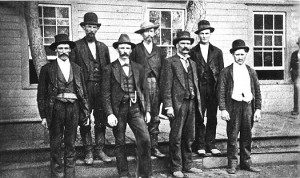All that glitters. . .
Quoth Murray N. Rothbard:
There is no aspect of the free-market economy that has suffered more scorn and contempt from “modern” economists, whether frankly statist Keynesians or allegedly “free market” Chicagoites, than has gold. Gold, not long ago hailed as the basic staple and groundwork of any sound monetary system, is now regularly denounced as a “fetish” or, as in the case of Keynes, as a “barbarous relic.” Well, gold is indeed a “relic” of barbarism in one sense; no “barbarian” worth his salt would ever have accepted the phony paper and bank credit that we modern sophisticates have been bamboozled into using as money.
But “gold bugs” are not fetishists; we don’t fit the standard image of misers running their fingers through their hoard of gold coins while cackling in sinister fashion. The great thing about gold is that it, and only it, is money supplied by the free market, by the people at work. For the stark choice before us always is: gold (or silver), or government. Gold is market money, a commodity which must be supplied by being dug out of the ground and then processed; but government, on the contrary, supplies virtually costless paper money or bank checks out of thin air. . . .
 Well. You might look a little closer at that
Well. You might look a little closer at that stark choice
there; I don’t know about you, but what I see is a false dichotomy. It is, in any case, an utterly absurd claim to make about the supply of gold or other forms of metal money. In (dis)honor of the upcoming nationalist High Holy Day:
The Europeans were motivated by their lust for glory, for conquest, for women and above all for gold. When the Indians had gold they were compelled to part with it; when they had none they were compelled to hunt for it. Among the Taino people of Hispaniola, Columbus decreed a system of tribute, requiring each adult to submit a specified quantity of gold, on pain of death. . . . In 1499, troubled by reports they had received from the faraway colonies, the Spanish monarchs empowered a judicial investigator to bring Columbus to account. The inquiry produced testimony that Columbus had forbidden the Christian baptism of Indians except by his express permission, in order to ensure an adequate supply of slaves.
— Ian W. Toll, The Less Than Heroic Christopher Columbus, in the New York Times Sunday book review
And then, from Niall Ferguson (2008), The Ascent of Money: A Financial History of the World, ch. 1:
In 1532 … the Inca Empire was brought low by a man who, like Christopher Columbus, had come to the New World expressly to search for and monetize precious metal. . . . Having returned to Spain to obtain royal approval for his plan
to extend the empire of CastileasGovernor of Peru,Pizarro raised a force of three ships, twenty-seven horses and one hundred and eighty men, equipped with the latest European weaponry: guns and mechanical crossbows. This third expedition set sail from Panama on 27 December 1530. It took the would-be conquerors just under two years to achieve their objective: a confrontation with [the Incan emperor] Atahuallpa. . . . Atahuallpa could only watch as the Spaniards, relying mainly on the terror inspired by their horses (animals unknown to the Incas) annihilated his army. Given how outnumbered they were, it was a truly astonishing coup. Atahuallpa soon came to understand what Pizarro was after, and sought to buy his freedom by offering to fill the room where he was being held with gold (once) and silver (twice). In all, in the subsequent months the Incas collected 13,420 pounds of 22 carat gold and 26,000 pounds of pure silver.[1] Pizarro nevertheless determined to execute his prisoner, who was publicly garrotted in August 1533. With the fall of the city of Cuzco, the Inca Empire was torn apart in an orgy of Spanish plundering. . . . Pizarro himself died as violently as he had lived, stabbed to death in Lima in 1541 after a quarrel with one of his fellow conquistadors. But his legacy to the Spanish crown ultimately exceeded even his own dreams. The conquistadors had been inspired by the legend of El Dorado, an Indian king who was believed to cover his body with gold dust at festival times. In what Pizarro’s men called Upper Peru, a stark land of mountains and mists where those unaccustomed to high altitudes have to fight for breath, they found something just as valuable. With a peak that towers 4,824 metres (15,827 feet) above sea level, the uncannily symmetrical Cerro Rico — literally therich hill— was the supreme embodiment of the most potent of all ideas about money: a mountain of solid silver ore. When an Indian named Diego Gualpa discovered its five great seams of silver in 1545, he changed the economic history of the world.The Incas could not understand the insatiable lust for gold and silver that seemed to grip Europeans.
Even if all the snow in the Andes turned to gold, still they would not be satisfied,complained Manco Capac. The Incas could not appreciate that, for Pizarro and his men, silver was more than shiny, decorative metal. It could be made into money: a unit of account, a store of value — portable power.To work the mines, the Spaniards first relied on paying wages to the inhabitants of nearby villages. But conditions were so harsh that from the late sixteenth century a system of forced labour (la mita) had [sic] to be introduced, whereby men aged between 18 and 50 from the sixteen highland provinces were conscripted for seventeen weeks a year. Mortality among the miners was horrendous, not least because of constant exposure to the mercury fumes generated by the patio process of refinement, whereby ground-up silver ore was trampled into an amalgam with mercury, washed and then heated to burn off the mercury. The air down the mineshafts was (and remains ) noxious and miners had to descend seven-hundred-foot shafts on the most primitive of steps, clambering back up after long hours of digging with sacks of ore tied to their backs. Rock falls killed and maimed hundreds. The new silver-rush city of Potosí was, declared Domingo de Santo Tomás,
a mouth of hell, into which a great mass of people every year and are sacrificed by the greed of the Spaniards to theirRodrigo de Loaisa called the minesgod.infernal pits,noting thatif twenty healthy Indians enter on Monday, half may emerge crippled on Saturday.In the words of the Augustinian monk Fray Antonio de la Calancha, writing in 1638:Every peso coin minted in Potosí has cost the life of ten Indians who have died in the depths of the mines.As the indigenous workforce was depleted, thousands of African slaves were imported to take their place ashuman mules.Even today there is still something hellish about the stifling shafts and tunnels of the Cerro Rico.A place of death for those compelled to work there, Potosí was where Spain [sic] struck it rich. Between 1556 and 1783, the
rich hillyielded 45,000 tons of pure silver to be transformed into bars and coins in the Casa de Moneda (mint), and shipped to Seville. Despite its thin air and harsh climate, Potosí rapidly became one of the principal cities of the Spanish Empire, with a population at its zenith of between 160,000 and 200,000 people, larger than most European cities at that time. Valer una potosí,to be worth a potosí,is still a Spanish expression meaning to be worth a fortune. Pizarro’s conquest, it seemed, had made the Spanish crown rich beyond the dreams of avarice. . . .. . . The difficulty[2] was that by the time Charlemagne was crowned Imperator Augustus in 800, there was a chronic shortage of silver in Western Europe. Demand for money was greater in the much more developed commercial centres of the Islamic Empire that dominated the southern Mediterranean and the Near East, so that precious metal tended to drain away from backward Europe. So rare was the denarius in Charlemagne’s time that twenty-four of them sufficed to buy a Carolingian cow. In some parts of Europe, peppers and squirrel skins served as substitutes for currency; in others pecunia came to mean land rather than money. This was a problem that Europeans [sic] sought to overcome in one of two ways. They could export labour and goods, exchanging slaves and timber for silver in Baghdad or for African gold in Cordoba and Cairo. Or they could plunder precious metal by making war on the Muslim world. The Crusades, like the conquests that followed, were as much about overcoming Europe’s monetary shortage[3] as about converting heathens to Christianity. . . .
At Potosí, and the other places in the New World where they found plentiful silver (notably Zacatecas in Mexico), the Spanish conquistadors . . . appeared to have broken a centuries-old constraint.[4] The initial beneficiary was, of course, the Castilian monarchy that had sponsored the conquests. The convoys of ships — up to a hundred at a time — which transported 170 tons of silver a year across the Atlantic, docked at Seville. A fifth of all that was produced was reserved to the crown, accounting for 44 per cent of total royal expenditure at the peak in the late sixteenth century. But the way the money was spent ensured that Spain’s newfound wealth provided the entire continent [sic] with a monetary stimulus. The Spanish
piece of eight,which was based on the German thaler (hence, later, thedollar), became the world’s first truly global currency, financing not only the protracted wars Spain fought in Europe, but also the rapidly expanding trade of Europe with Asia.
The Money Monopoly is a many-headed beast, and it sure didn’t start with paper money; nor did its activities in the days before fiat currency consist exclusively of (say) debasing metallic currencies that the conjurers of market forces
had miraculously called forth from the earth. The tale of coinage, and the monetization of precious metals, is largely a tale of dispossession, slavery, and the most atrocious, literally genocidal forms of mass government violence. Yesterday, @ndy at Slackbastard reposted a brilliant and devastating passage from Jorge Semprun’s What A Beautiful Sunday! on the moloch of Bolshevism and the graves at the Kolyma gulag:
But, Shalamov tells us, — the eternally frozen stone and soil of the merzlota rejects corpses. The rock has to be dynamited, hacked away. Digging graves and digging for gold required the same techniques, the same tools, the same equipment, the same workers. An entire brigade would devote its days to cutting out graves, or rather ditches, where the anonymous corpses would be thrown fraternally together …. The corpses were piled up, completely stripped, after their gold teeth had been broken off and recorded on the burial document. Bodies and stone, mixed together, were poured into the ditch, but the earth refused the dead, incorruptible and condemned to eternity in the perpetually frozen earth of the Great North . . . .
. . . In Moscow, at the Mausoleum at Red Square, incredible, credulous crowds continue to file past the incorruptible corpse of Lenin. I even visited the mausoleum myself once, in 1958. At that time, Stalin’s mummy kept Vladimir Ilyich company. . . . Ten years later, in London, after reading that passage in Varlam Shalamov’s book, I remembered the tomb in Red Square. It occurred to me that the true mausoleum of the revolution was to be found in the Great North, in Kolyma. Galleries might be dug through the charnel houses — the construction sites — of socialism. People would file past the thousands of naked, incorruptible corpses of prisoners frozen in the ice of eternal death. There would be no guards; those dead would not need guards. There would be no music, either, no solemn funeral marches playing in the background. There would be nothing but silence. At the end of the labyrinth of galleries, in a subterranean amphitheater dug out of the ice of a common ditch, surrounded on all sides by the blind gazes of the victims, learned meetings might be organized to discuss the consequences of the
Stalinist deviation,with a representative sprinkling of distinguished Western Marxists in attendance.
And in much the same way, I suppose that the true mausoleum of the merchant-state and state capitalism could be in the hellmouth tunnels of the Cerro Rico. At the end of the labyrinth (already cut, already stifling with the stench of death), in a subterranean amphitheater surrounded by the ghosts of the enslaved miners, learned meanings might be organized to discuss what government has done to our money, with a representative sprinkling of distinguished libertarian economists in attendance.
Or perhaps it would just as well be held in the Great North, right alongside the monument to Marxist-Leninism.
Kolyma, too, was a gold mining camp.
- [1]About a quarter of a billion dollars, in 2011 US money. –CJ↩
- [2]For European kings, not for their victims. –CJ↩
- [3]Sic — of course he means European governments’ monetary shortage. The continent of Europe has no use for money, and most of the people of Europe never had metallic money in any great amount either before or after the various conquests.↩
- [4]By breaking the earth — and that, in turn, by breaking a few million enslaved Indians and Africans. –CJ↩

 From
From 


